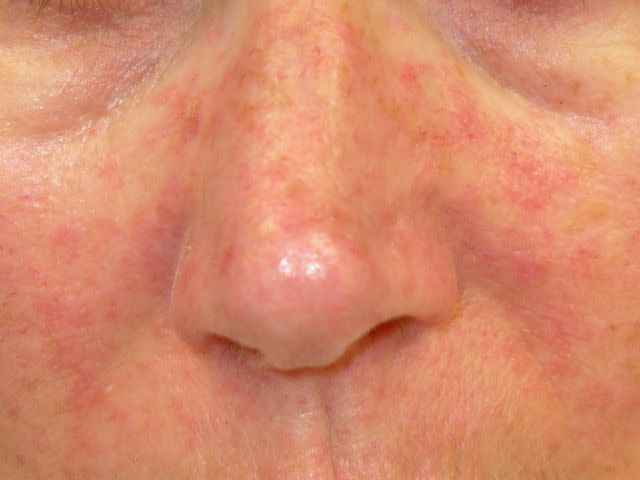What Is Zika Virus?

Siwat Charoenkit / EyeEm / Getty Images
Medically reviewed by Ronald Lubelchek, MD
Zika virus is an infection spread by an infected Aedes species mosquito, specifically Aedes aegypti and Aedes albopictus. These mosquitoes bite during the day and night, and while they originated in tropical climates, they are now found nearly everywhere but Antarctica.
Most people who become infected with Zika don't develop symptoms; if they do, symptoms are usually mild. Zika infections are the riskiest for pregnant people and their fetuses.
This article explores facts about Zika infections and what you need to know to stay safe.

Reproduced with permission from ©DermNet NZ www.dermnetnz.org 2022
Risks of Zika Virus in Pregnancy
Although most people don't develop noticeable or severe symptoms, pregnant people and fetuses face an increased risk.
Pregnant people can pass the virus on to the fetus. Zika can also be transmitted during sexual contact. If this happens, the fetus can develop microcephaly. This is a rare neurological condition that impacts brain growth and development, leading to brain damage or deficiencies. Other congenital conditions—those identified at or soon after birth—are also possible, including miscarriage and stillbirth.
Traveling While Pregnant
The Centers for Disease Control and Prevention (CDC) advises people to avoid traveling to areas with known Zika transmissions while pregnant or breastfeeding to prevent passing the virus to the fetus or infant.
The agency also recommends that people trying to conceive discuss their travel plans and the potential risks of infection with their healthcare provider. Specifically, women trying to conceive are advised to wait about two months after traveling to try to become pregnant.
Zika Virus Transmission
Although infected mosquitos are the primary source of Zika infections, infected people can spread the virus to others during the following:
Sexual contact
Pregnancy (from birthing parent to fetus)
What Are Symptoms of Zika?
The symptoms of Zika virus are typically mild or don't occur at all. However, if symptoms do arise, they include:
Regions With Past Zika Outbreaks
Zika outbreaks were first recorded in humans in Uganda in 1947 and then in Nigeria in 1954. Since then, the virus has been found all over the globe, with the most prominent recent outbreaks in:
Micronesia (2007), an island nation in the western Pacific Ocean
French Polynesia (2013, 2014), comprising 100 islands in the South Pacific
Brazil (2015)
The CDC reports that outbreaks in the United States have been limited and found in areas with temperate climates, including:
Puerto Rico
U.S. Virgin Islands
Guam
Hawaii
Florida
Texas
Read Next:Zika Virus Facts and Statistics: What You Need to Know
Zika Prevention During International Travel
The best way to protect yourself from the Zika virus when traveling is to investigate the viral activity of your destination before you go. Since there is no vaccine to protect you against infection, high transmission rates during your planned travel period may prompt you to change plans or take additional precautions.
According to the CDC, no locally transmitted Zika infections have been identified in the continental United States since 2018.
There is no Food and Drug Administration (FDA)–approved vaccine or treatment for a Zika viral infection, but it hasn't been for lack of trying. Vaccine research has investigated many paths to vaccination, but the virus has been able to evolve or avoid neutralization by these vaccine attempts. Several vaccines are undergoing testing and are in various stages of development and clinical trials.
How Do You Protect Your Skin From Zika Mosquitos?
While there's no vaccine to prevent a Zika infection yet, there are measures you can take to protect yourself, including:
Wear clothing that covers your arms and legs.
Treat clothing with an insect repellent like permethrin or buy pretreated clothing.
Stay in places that are air-conditioned or have insect netting around sleeping areas.
Control mosquitos in and around your home.
Use a condom or avoid sexual intercourse if you or your partner have a Zika infection.
Zika Diagnosis
Blood, urine, and tissue samples can be used to diagnose Zika, but these tests are most effective during the first two weeks of symptoms. The problem with existing testing methods is that an active Zika infection could be mistaken for antibodies from a past infection or similar viruses like dengue.
Researchers are working to develop newer tests that can more precisely differentiate between active and old Zika infections and other similar viral infections.
Research suggests that having a Zika infection once may protect you from being infected again. One study from 2016 found that a Zika infection with a particular strain provided protection for several months from the same strain. Whether this protection lasts a lifetime or offers protection against variants of the Zika virus isn't as clear.
Treatment for Zika
There's no specific medication or treatment to cure a Zika infection. Instead, experts recommend treating the symptoms of your illness with things like:
Rest
Fluids
Acetaminophen to treat fever or pain
You should avoid taking nonsteroidal anti-inflammatory drugs (NSAIDs), such as Advil or Motrin (ibuprofen), Aleve (naproxen sodium), and aspirin, if you have Zika. Discuss any other medical conditions or medications you take with your provider if you become infected with the Zika virus
Outlook for Zika Virus
The Zika virus doesn't cause severe illness or noticeable symptoms for most people. Some people, however, can develop certain complications, including nerve damage or a rare neurological condition called Guillain-Barre syndrome (GBS). These conditions can permanently and irreversibly alter your health and overall quality of life.
Zika can cause congenital conditions, including brain damage, in developing fetuses. Talk to your healthcare provider if you suspect you have a Zika infection or to learn how to protect yourself if you travel to a high-risk area.

